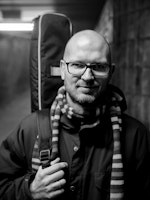Hans Petter Solli leads the way from Reception at the Lovisenberg District Psychiatric Centre (LDPS) in Tøyen. Through a door and down the stairs to the basement, past shelves of correction fluid, virgin notebooks and stacks of coffee filters lies the music therapy room, which is Solli’s office. Against one wall is a piano, amplifiers are lined up in rows along the floor, and a drum kithas been set up in one corner. Room has also been made for guitars, percussion instruments and a small recording studio between the yellow-painted walls. For a music therapist who is also a drummer, is it tempting just to sit down and play a bit occasionally?
“I work with severely ill patients, and sometimes I need to chill out too. I don’t have a bad conscience if I sit down behind the drum kit in order to get my strength back after a session.”
Solli has taken a seat in one of the two chairs that, together with asmall round table, make up the seating group in the room. He’s at the initial stage of his post doctoral project “MusTCare: Implementing music therapyin an outreach mental health team”, in which he will be examining how music therapy for patients with severe mental illnesses and substance addiction can be implemented within a FACT team in the Gamle Oslo district.
FACT is short for Flexible Assertive Community Treatment – and is a model designed to provide holistic services to people with severe mental illness living in their own home. Solli tells me there are 15 FACT teams in Norway, and a further 18 are in the process of being set up. The model has also gained a footing internationally, in countries including Sweden, the Netherlands and the USA, and Solli is hoping that the research he is about to embark on will also assume relevance beyond Norway’s national borders.
“The FACT team’s work is based on a recovery-minded approach, which means taking an interest in how to give patients as good a life as possible despite their challenges. Some want to get stoned or drunk, and you have to accept that substance abuse is something they will carry on with. A fair amount of those who have psychoses must expect to live with the symptoms for the rest of their lives. So instead of just focusing on trying to put an end to the symptoms, we are more interested in giving them a good quality of life – work for social bonding, foster hope and offer meaningful activities that make life feel worth living.”
But the FACT team has a limited repertoire when it comes to how to help individual patients, according to Solli.
“Especially those who are unmotivated and have poor relational skills. Music therapy is a resource-oriented approach in which there is no great need to talk, and music is something that gets people excited, after all. Without music life becomes sad, many say. So too for us, and for many of my patients as well.”







